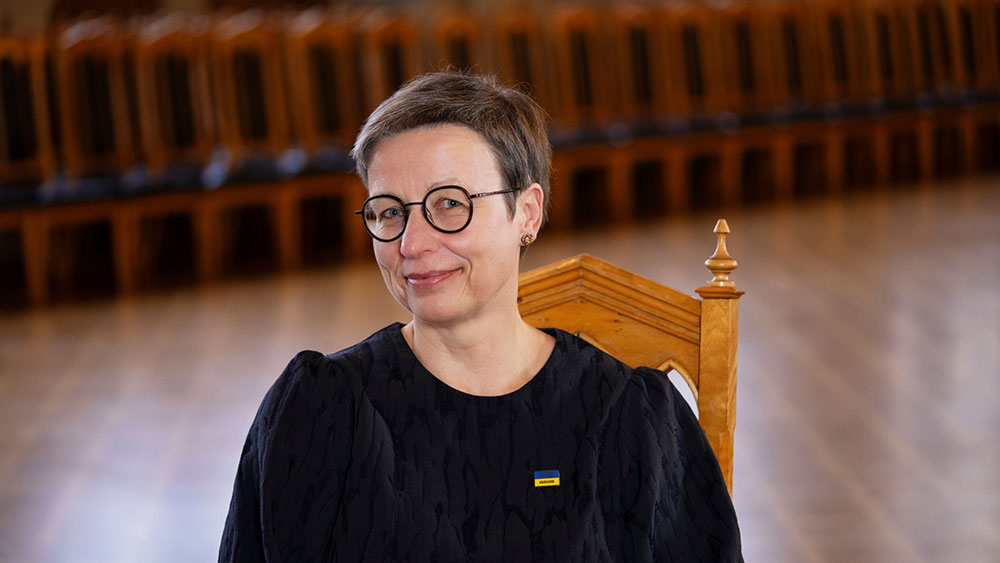Grīnberga has translated an unparalleled 100 books into Latvian
Finnish State Award for Foreign Translators to Maima Grīnberga

This year, the recipient of the Finnish State Award for Foreign Translators is Maima Grīnberga (b. 1969), who has been translating Finnish literature into Latvian with distinction. The prize, which has been awarded since 1975, is worth EUR 15,000. The Ministry of Education and Culture awards the prize annually based on a proposal by the Finnish Literature Exchange (FILI).
In 27 years, Grīnberga has translated an unparalleled 100 books: over 40 from Finnish to Latvian and about 60 from Estonian to Latvian. Grīnberga started her career in 1996. Today, she is one of the most respected literary translators, with extensive networks of experts in both Latvia and Finland. Her list of publications includes Finnish fiction as well as children’s and young adult literature, non-fiction books and plays.
“Translators do important work. It is a good example of how the entire chain must be in order to ensure that a Finnish book goes out into the world and is read by readers in other countries. The Government wants to strengthen the internationalisation of the cultural sector. Literature serves as an excellent example of a sector that is supported by the growth strategy for the creative industries,” says Minister Sari Multala.
After studying Latvian philology in Riga for a few years, Grīnberga switched to Estonian philology at the University of Tartu. The curriculum also included “forced Finnish”, which she fell in love with when she first travelled to Helsinki on M/S Georg Ots and heard homeless alcoholics swearing. Grinberga was introduced to Finnish-language literature during an international summer course in Kuopio in the early 1990s, where her teacher, Marja-Leena Miettinen, recommended five novels to her student. The prose of Rosa Liksom and Pentti Saarikoski swept her off her feet.
“Almost every book has its own questions. And its challenges. As a translator, the books that have required the most thought, experimentation and effort have been books in which the author has used both standard language and dialects, such as the texts of Rosa Liksom, The Unknown Soldier by Väinö Linna and The Midwife by Katja Kettu, as well as books where language plays a special role, such as Park Life by Mikko Rimminen,” says Grīnberga.
She still remembers vividly how great it felt to find the right rhythm and flow for the translation of The Egyptian by Mika Waltari.
“I also felt grateful when translating Brightness by Riitta Jalonen and 14 Knots to Greenwich and The Celestial Sphere by Olli Jalonen. I have also enjoyed Johanna Sinisalo’s sparkling texts a great deal. I could go on and on: Selja Ahava, Tommi Kinnunen, Katri Lipson, Riikka Pulkkinen, Emmi Itäranta, Kristina Carlson, Sinikka Nopola, Tiina Nopola, Aino Havukainen, Sami Toivonen and everyone else – thank you,” says the award-winning translator.
Grīnberga is currently translating a comprehensive selection of poetry by Eeva-Liisa Manner and Osmo Tapio Räihälä’s Finlandia Award-winning non-fiction book Miksi nykymusiikki on niin vaikeaa on why contemporary music is so difficult. Next in line is the novel Lumo by Riikka Pulkkinen.
“Everything I have learned and everything I have understood about translation I have absorbed while translating and discussing things with colleagues and revisers. One of my most important insights has been how dependent everything is on context. Each new book is a new world with its own possibilities and rules.”
Inquiries and requests for interviews: Hannele Jyrkkä, Communications Manager, FILI, tel. +358 40 534 7526, [email protected]
The Finnish Literature Exchange (FILI) takes Finnish literature international. FILI also issues translation and printing grants. FILI was established in 1977 in connection with the Finnish Literature Society.

